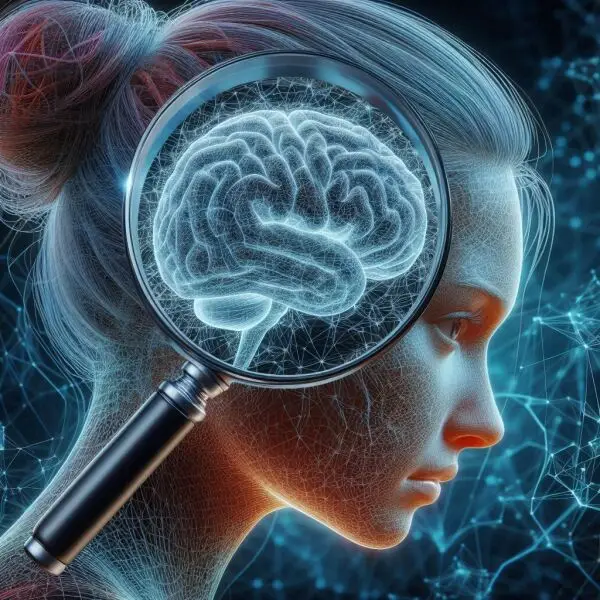Discover the Real Age of Your Brain: Is It Younger or Older?
Discover if your brain is younger or older than your actual age. Learn techniques to assess your mental health and improve your well-being. Get informed here!...
Table of Contents
- The Difference between Chronological Age and Brain Age
- Signs of a Young Brain
- Identifying Signs of Cognitive Aging
- The Importance of Rest and Meditation
Follow Patricia Alegsa on Pinterest!
The Difference between Chronological Age and Brain Age
Have you ever wondered if your brain reflects your chronological age or if, on the contrary, it could be younger or older? Brain age doesn't always match.
Various factors, from lifestyle to genetics, can influence brain health and, therefore, its "age."
As we advance in our understanding of the human brain and its functions, methods have been developed to assess its state and determine whether its cognitive performance corresponds to, exceeds, or falls below what is expected for our age.
Knowing your brain age can be key to taking measures that promote healthy aging and prevent cognitive decline.
Chronological age refers to the time that has passed since our birth, while brain age considers the state and functioning of our brain.
Chronological age refers to the time that has passed since our birth, while brain age considers the state and functioning of our brain.
Research has shown that a 50-year-old person may have a brain that functions like that of a 30-year-old, or vice versa. Thus, knowing your brain age can provide you with valuable information about your mental well-being.
Discover mental menopause in women
There are certain indicators that can reveal whether our brain remains young and agile. Subjective age, or the age you feel, is a positive sign of a young brain.
Discover mental menopause in women
Signs of a Young Brain
There are certain indicators that can reveal whether our brain remains young and agile. Subjective age, or the age you feel, is a positive sign of a young brain.
A study from the National University of Seoul and Yonsei University found that people who feel younger than their chronological age show fewer signs of brain aging.
This may be related to an active lifestyle, both physically and mentally. Engaging in activities that make you feel young, such as learning a new language or listening to current music, can have a positive impact on your cognition.
Additionally, being bilingual is associated with a more efficient brain.
Additionally, being bilingual is associated with a more efficient brain.
Research indicates that people who speak two languages have more centralized neural connections, allowing for more efficient information processing.
Learning a new language is not only a workout for the mind, but it can also help preserve cognitive health in the long run.
The aging of the brain can manifest in various ways. A Finnish study has shown that cynicism can be detrimental to brain health, as it is linked to greater cognitive decline.
Identifying Signs of Cognitive Aging
The aging of the brain can manifest in various ways. A Finnish study has shown that cynicism can be detrimental to brain health, as it is linked to greater cognitive decline.
Negative stress associated with a cynical view of the world can affect cognitive functions and hinder clear thinking.
Difficulty concentrating and constant distraction are also signs of cognitive aging.
Difficulty concentrating and constant distraction are also signs of cognitive aging.
A research team from the University of Southern California found that the tendency to become easily distracted can appear in the brain as early as age 30, and is an early sign of possible disorders such as Alzheimer's.
If you experience concentration problems, it is advisable to engage in brain training exercises to improve your skills.
Guide to Preventing Alzheimer's
Daytime drowsiness can be an indicator that the brain is not receiving adequate rest. A study from the Mayo Clinic suggests that a lack of restorative sleep can cause physical changes in the brain related to aging.
Guide to Preventing Alzheimer's
The Importance of Rest and Meditation
Daytime drowsiness can be an indicator that the brain is not receiving adequate rest. A study from the Mayo Clinic suggests that a lack of restorative sleep can cause physical changes in the brain related to aging.
Ensuring that you sleep between seven and eight hours of quality sleep each night is essential for brain health.
Additionally, practices such as meditation can help preserve the gray matter of the brain, which is essential for good memory.
Additionally, practices such as meditation can help preserve the gray matter of the brain, which is essential for good memory.
Meditation has been shown to stimulate the formation of new neural connections, which can contribute to maintaining a healthy and agile brain.
Meditation techniques with yoga
Knowing the true age of your brain is an important step toward mental well-being. Adopting healthy habits, staying active, and caring for sleep quality are key to promoting healthy brain aging.
Meditation techniques with yoga
Knowing the true age of your brain is an important step toward mental well-being. Adopting healthy habits, staying active, and caring for sleep quality are key to promoting healthy brain aging.
Subscribe to the free weekly horoscope
Aquarius Aries Cancer Capricorn Gemini Leo Libra Pisces Sagittarius Scorpio Taurus Virgo
-
 Take Care of Your Brain: A Guide to Preventing Alzheimer’s with Diet and Habits
Take Care of Your Brain: A Guide to Preventing Alzheimer’s with Diet and Habits
Discover how to take care of your brain and reduce the risk of Alzheimer’s with our comprehensive guide on dietary changes and healthy habits. Start today! -
 Miracle plant to combat flies: frees windows from insects
Miracle plant to combat flies: frees windows from insects
Discover the plant that repels flies and beautifies your home. Aromatic for you, but their terror. The natural and decorative option you need! -
 Discover the sleep routine that reduces heart risk by 20%
Discover the sleep routine that reduces heart risk by 20%
Discover how a balanced sleep routine can reduce the risk of heart disease by 20%, according to a 14-year study with 90,000 participants. -
 The Secret of Longevity: Lifestyle is More Important than Genes
The Secret of Longevity: Lifestyle is More Important than Genes
Surprise! Lifestyle surpasses genes in health and aging, reveals study with half a million people. Goodbye, dementia and heart problems! -
 Study reveals an increase in cancer among young people: Why?
Study reveals an increase in cancer among young people: Why?
Study reveals an increase in diagnoses among young people between 2000 and 2019. The most common cases are identified and the causes of this increase are investigated.
I am Patricia Alegsa
I have been writing horoscope and self-help articles professionally for over 20 years.
Subscribe to the free weekly horoscope
Receive weekly in your email the horoscope and our new articles on love, family, work, dreams and more news. We do NOT send spam.
Astral and numerological analysis
-
 Discover your future, secret personality traits and how to improve in love, business and life in general
Discover your future, secret personality traits and how to improve in love, business and life in general
-
 Online Dream Interpreter: with artificial intelligence
Do you want to know what a dream you had means? Discover the power of understanding your dreams with our advanced online dream interpreter using artificial intelligence that responds to you in seconds.
Online Dream Interpreter: with artificial intelligence
Do you want to know what a dream you had means? Discover the power of understanding your dreams with our advanced online dream interpreter using artificial intelligence that responds to you in seconds.
-
 Discover how sleep resets your memory and enhances learning
Discover how sleep resets your memory and enhances learning
Discover how sleep resets brain cells, allowing the hippocampus to store memories and enhance learning for a new day. -
 Moving your body daily rejuvenates your immune system and reduces the risk of cancer
Moving your body daily rejuvenates your immune system and reduces the risk of cancer
Moving your body daily rejuvenates your immune system and reduces the risk of cancer: up to 34% of deaths from inflammation could be prevented with physical activity. -
 Best times to consume foods that care for your heart and digestion
Best times to consume foods that care for your heart and digestion
Discover how including them in your diet improves cardiovascular health. Learn the best time to consume them and prevent constipation. Get informed now! -
 Do you feel lonely? A global study reveals that 1 in 4 people feels lonely
Do you feel lonely? A global study reveals that 1 in 4 people feels lonely
Loneliness alert! A study shows that 1 in 4 people feels lonely. Emmanuel Ferrario on Infobae en Vivo unveils how technology and urban design affect our emotions. -
 Why is it harder to recover after the age of 40?
Why is it harder to recover after the age of 40?
Discover why it's harder to recover at 40: the body ages, and a bad night or flu affects it more. Science explains it! -
 Risks of Excessive Painkillers and Safe Alternatives
Risks of Excessive Painkillers and Safe Alternatives
Pain Day: Impact of Painkiller Abuse. Experts warn about high doses and propose safe alternatives to balance need and prudence. -
 The ideal diet after 40 years: keys for muscle, energy, and a healthy mind
The ideal diet after 40 years: keys for muscle, energy, and a healthy mind
Discover what to eat after 40: key foods to strengthen muscles, energy, and mind, according to health and nutrition experts. -
 8 effective ways to resolve conflicts and tensions at work
8 effective ways to resolve conflicts and tensions at work
Discover powerful strategies to resolve interpersonal conflicts at work and with people close to you, learn how to manage difficult situations effectively and improve your relationships! -
 What does it mean to dream of a car ride?
What does it mean to dream of a car ride?
Discover the true meaning of dreaming of a car ride and how this dream can reveal information about your life and future. Read our article now! -
 What does it mean to dream of flashlights?
What does it mean to dream of flashlights?
Discover the fascinating world of flashlight dreams. Learn their meaning and how to interpret them in this article - don't miss it! -
 What does it mean to dream of writing?
What does it mean to dream of writing?
Discover the fascinating world of dreams with our article What does it mean to dream of writing? Explore how your thoughts and emotions manifest themselves in your dreams. -
 Discover how to turn your greatest flaw into your greatest strength according to your zodiac sign
Discover how to turn your greatest flaw into your greatest strength according to your zodiac sign
Turn your greatest flaw into your greatest strength according to your zodiac sign - don't miss it! -
 What does it mean to dream of sporting events?
What does it mean to dream of sporting events?
Discover the fascinating world of sports dreams and their meaning in this article. What do your dreams reveal about your life and personality? Read now!